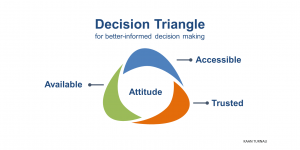Imagine this: It’s your first day at a new job. You’ve got some butterflies in your stomach, enter the office building, and… there’s no one to greet you. You ask the receptionist where you’re supposed to go, and it’s evident he didn’t even know you were starting today.
No one takes you to lunch, or introduces you to the rest of the team. Eventually, the receptionist takes your paperwork, you’re led to a desk, handed a headset and script, and you’re told — get to work!
How would that make you feel as a new employee? Or, as a newly appointed manager?
Probably pretty lost, overwhelmed, and devalued. You’re likely wondering if you made the right choice to accept the job. Would you stick with it?
Now, that’s quite an extreme example. But, traditionally, call centers don’t have the greatest track record with retention. In fact, the rate of turnover in midsize-to-large call centers is as high as 45%. And, a majority of that turnover is with entry-level agents. And while many factors play into your attrition, the first few months of employment can make or break whether an agent will keep working for you.
According to a survey from Robert Half & Associates, more than a quarter of employees are willing to quit a new job in the first 90 days if they don’t find it satisfactory.
First Impressions Matter
The Recruiting Roundtable found that effective onboarding improves performance by 11.5%.
But, onboarding new employees right is tricky. In many contact centers, new-hire orientation can be disorienting. Though intended to help rookie agents get acclimated to the new job and environment, too much too soon can have the opposite effect. The deluge of info, policies and resources thrown at agents in a span of a few days often leaves newbies with their heads spinning rather than their feet planted.
Do — Provide a comprehensive pre-hire job preview
While prospective hires go through the hiring process, provide a clear picture of what a rewarding call center agent job entails. Think of it as a shadowing experience.
This will engage and inspire candidates who are cut out for the work of customer care. It also helps candidates decide whether they see themselves as part of your culture. Avoid pouring money and energy into hiring and training those who don’t really want the job in the first place.
Set up a time for candidates to interact with your existing agents. Have a selection of agents who will be involved in your interview process who can help answer questions for you prospective hires. Give candidates a tour of the office, let them listen to some call recordings with customers to listen to an experienced agent at work. This kind of early interaction with those who will be their peers goes a long way in creating early camaraderie.
Employee retention expert Dick Finnegan recommends introducing an Employee Value Proposition (EVP) during the job preview process:
“While it’s true that employees are interested in how much they are going to get paid and all those types of things, what they really want to know is: What am I going to learn? Who am I going to help? And what kinds of relationships am I going to form? Smart companies provide an EVP that clearly answers those questions. The rest of your onboarding program should then just carry the EVP further and deeper.”
Give potential employees a reason to join your team and set the bar for the value they would bring to your team even during the hiring process.
Don’t — Abandon your new agent after day one
Most companies know the first day of work should include some orientation. As a manager, you should be intentionally involved on the first day for any new hire. Clear out your schedule so you’re available to answer questions and give guidance.
Nearly 89% of new hires want to meet with their new manager on the first day of employment. And, 83% said they had the expectation of being introduced to colleagues on their first day in order to start off on a positive note.
But when the first day is over and done with, whose responsibility is it to make sure new hires get further acclimated? There’s a tendency to throw your agents into the learning phase, to read and observe, and expect them to catch on. I’ve had several jobs where after the first day, it feels like I’ve gotten tossed out to the middle of the ocean. It’s very overwhelming. You don’t want to feel like you’re bothering anyone’s workflow. This makes it scary to ask questions or show ignorance.
To avoid this, set up an onboarding team or a buddy system.
The Aberdeen Group says that best-in-class organizations tackle onboarding on three fronts:
- HR document management – This is where they’ll fill out, collect and track all of the HR forms (I-9, Tax forms, contracts, etc.) in an accessible way.
- Task management – These are tasks like meeting managers and leaders, job training and other protocols.
- Socialization – This is where they’ll get an introduction to the company culture and their team.
Having an onboarding or hospitality team takes some of the burden off the shoulders of your HR staff or the hiring manager alone. Build a team made of a couple of team leads of different departments and some of your agents. It spreads out the responsibility of these three fronts across multiple teams or individuals.
This team can be responsible for making sure the new hire has someone to eat lunch with during break. Maybe they have a stand-up meeting at the end of each day where the new hire can ask questions, learn about internal processes, or find resources.
One company, Buffer, assigns three buddies while onboarding new employees, each with a different role to play. There is a Leader Buddy, a Role Buddy, and a Culture Buddy, all of whom help new hires through the onboarding process.
Give your new hires a point person so they feel less anxious when first joining.
Do — Broadcast your company culture
Research shows that 81% of new hires are unsuccessful at their new jobs because they’re cultural misfits. When your onboarding process actively reinforces your company culture, it can lead to:
- 60% greater annual improvement in revenue per full-time employee.
- 63% greater lift in annual customer satisfaction than those with an informal onboarding process.
Those benefits have company-wide ramifications! Culture is vital for retention and company growth. When onboarding new employees at Zappos, they offer a five-week course focused on the culture and values of the company. At the end of the five weeks, they offer employees $ 2k to quit if they feel like the culture is not the right fit for them. They know if an employee isn’t a good fit with the culture, it impacts engagement, and ultimately performance.
Your company culture should be central to your company identity and therefore, shouldn’t be hard to find.
In the first two days, highlight your company’s story, mission and values right off the bat. You want your new employee to have a sense of how they fit into your broader company story and strategy. Their tie to mission and value will give a new agent a foundation for understanding your company.
Find out what your new employee cares about personally and tie it to your company values. Show them how their passion can be fulfilled through working with your team. For example, if one of your core values is generosity and your new hire regularly volunteers with a local nonprofit, discuss how they can promote their cause at work. If you can help the employee connect with purpose from day one, they’ll be more likely to stay with you.
Don’t — Put off adding your call center agents to your software
As a call center, you’re dependent on the effectiveness of your call center software. When you’re onboarding new employees, each agent needs their own line, their own desktop, their personalized reports. And, you have to assign certain skills and fit them into your call routing strategy, too. And, above all, you have to make sure that your new call center agent knows how to use the technology well.
It’s important to have this ready to go on your agent’s first day in the office. You want them to feel prepared and give them the tools they need to start learning. Don’t put this off, though. Setting up tools for your agent’s success can be time-consuming and complicated.
Depending on your call center software, this might mean going through your IT team and getting approval from your finance department. Or, you may have to go through your vendor just to make it happen. You know how it is. Emails back and forth, a phone call meeting to set expectations with your vendor, awaiting the go-ahead from your IT team. This could take several weeks.
Some vendors, though, offer software that makes these steps quick and easy. When considering software vendors or writing your RFP, prioritize a platform that gives you the power and control as a manager. Do you have the ability to add a line, onboard a new agent, and coach them on day one? Cut out the middle steps that over complicate things and make your job tricky when you have multiple new hires.
Even then, consider what it takes to get your agent ramped up on the software. Don’t leave your new employee on their to acclimate to your technology. Maintain customer satisfaction levels by assuring agents, new or experienced, have the processes they need to improve your KPI’s. Start your new agent on a regular 1:1 coaching schedule. As you onboard, meet with new hires more than experienced agents, so you can track their performance and competence early on.
When Onboarding Makes all the Difference
Putting in the effort to create an effective onboarding plan can make all the difference for your call center. Paycor reports that 58% of employees are likely to stay at a company for three years if they experience a great onboarding program.
Combat those dismal turnover rates in contact centers. Prioritize your new hires’ first 30 to 90 days on your team. Practice the do’s and don’ts of onboarding new employees and watch those retention rates fly through the roof.
Maintain retention by empowering your call center agents throughout their time on your team.
Business & Finance Articles on Business 2 Community
(22)
Report Post





